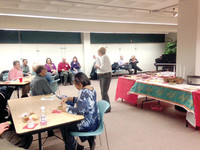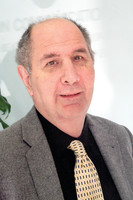“There are two days I don’t do job placement,” Steve Colella tells a group of assembled job seekers at the West Warwick Public Library. “Christmas Eve and Christmas Day.”
Every other …
This item is available in full to subscribers.
We have recently launched a new and improved website. To continue reading, you will need to either log into your subscriber account, or purchase a new subscription.
If you are a current print subscriber, you can set up a free website account by clicking here.
Otherwise, click here to view your options for subscribing.
Please log in to continue |
|


“There are two days I don’t do job placement,” Steve Colella tells a group of assembled job seekers at the West Warwick Public Library. “Christmas Eve and Christmas Day.”
Every other day of the year, though, he’s collecting résumés, making calls to his contacts in companies throughout New England and counseling members of Job Club RI, the volunteer-run organization he founded in 2008 in the midst of the Great Recession.
A full-time vocational counselor at UMass Worcester, Colella pours his remaining hours, as well as sick days and vacation time, into the Job Club. Former members of the club, now employed, volunteer their time as board members and session leaders.
The organization’s program spans six weeks, with each group comprising about 40 participants and meeting at the West Warwick Public Library. Membership is free and no one is turned away. Job seekers in each cycle list their contacts in local companies and are encouraged to take advantage of this newfound network. Mock interviews are staged; participants are urged to write and practice an elevator speech, quickly describing their talents and experience. Speakers visit the group to talk about interviewing and networking. But most important to what the group calls its “grassroots approach,” Colella has established numerous contacts at companies throughout New England, which helps his members’ résumés float to the top of the pile.
“It’s so impersonal to look for work right now,” Colella says.
With the bulk of applications processed electronically, job seekers are more likely to receive radio silence than outright rejection from the companies to whom they apply. With actual human contacts in these companies, Colella can help the job seekers stand out in the crowd of faceless applicants.
On Tuesday, December 20, the group gathered for the last session of the cycle, a time usually spent celebrating the holidays with a little networking thrown in. This time, though, Steve and several board members decided to run the group through a networking boot camp. Trays of snacks and Christmas cookies still packed the tables in the center of the room while music played in the background, but the job seekers were warned to steer away from chitchat. This meet-up was about practicing an essential skill.
We all have networks
Volunteer and former Job Club member Deb Stabile assured the group, “You all have a network, whether you believe it or not.” She warned them not to “hang with one person or one spot” and tasked them with interacting with four to six people for eight to 10 minutes each.
“Get comfortable with people you don’t know,” she urged.
By the end of the sessions, members needed two coffee dates on the calendar (not just scheduled for “after the holidays,” warned Stabile, or “it’s never gonna happen”).
After 45 minutes, the group reassembled to debrief the experience.
“Everyone survived,” Stabile said. “I didn’t see anyone pass out on the floor.”
A few participants reported productive conversations; most had succeeded in making the required four to six connections. Stabile asked for a show of hands: “How many people broke out of their shell?”
One member reported that a participant of a previous cycle had just found full-time employment. The group applauded, and Colella remarked, “I’ll have to email her when I get home.” He announced that he’d recently met with the Kraft Group, owners of the New England Patriots, for possible inclusion in the job bank.
Then Stabile had a few tips for the coming weeks of unemployment, instructing members to find a “buddy” in the group who would keep them committed to the job search and in a hopeful frame of mind. She reminded the group that the company they kept while unemployed was vital to the success of their job search. “If you’re not surrounded by positive people or people who can support you through the process,” she said, “you need to find those people.”
Years after the recession, the group has more freedom to focus on career development rather than crisis management. Based in Foxborough, Mass., the Kraft Group reflects Job Club RI’s expansion: job seekers have started to flock from Massachusetts to the library in West Warwick. Colella explains that the group is serving a population whose needs are not being met by the Department of Labor and Training, which tends to focus on skill development. Job Club RI, in contrast, caters to mid-career, middle-class job seekers who are already skilled and are looking to continue their work in IT, sales, finance and project management. Often, the job search they undertook in their 20s bears little or no resemblance to the current Internet-based market. The online professional network LinkedIn frequently comes up in Job Club sessions, as many members are unfamiliar with it.
Pitfalls of unemployment
Beyond skills and a bank of potential employers, Job Club RI seeks to address the emotional pitfalls of unemployment. A trained counselor, Colella is instrumental in helping members with this aspect of the job search.
He acknowledged that “it’s always difficult to do Job Club during the holidays” but “it’s the season of light and hope. We try to give you light and hope.” And even with the participation of volunteers, Colella continues to do the bulk of the work to keep the organization going and grow the job bank.
“Steve’s the inspiration,” says John Cronin, chair of the organization’s board of directors. “He’s the one who dedicates all this time and energy. He’s got magic.”
But Colella’s 30 hours a week or more of unpaid work for the organization is somewhat unsustainable: the group is applying for corporate and foundation grants to hire paid staff members, including a part-time vocational counselor.
According to Colella, the organization has a 70 percent success rate in finding jobs for its members. If not for this success –if the organization weren’t meeting its goals or making concrete change in the lives of participants – he wouldn’t be pouring this much time into it: “I’d be in Tahiti right now.”
As the members wrapped up the last session of the year and prepared to leave the library, Stabile expressed the hope that all would find employment soon.
“We love you,” she joked, “but we don’t wanna see you again.”
Comments
No comments on this item Please log in to comment by clicking here